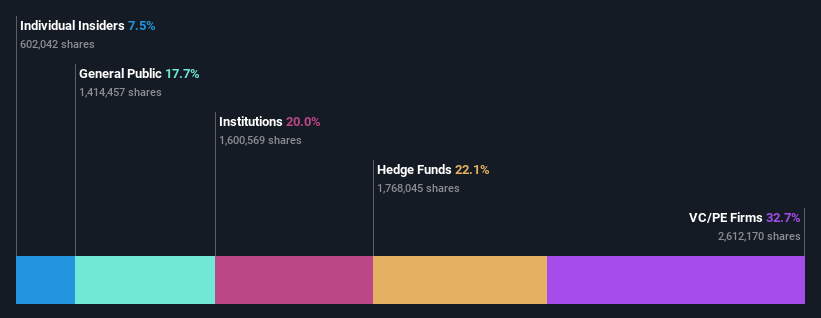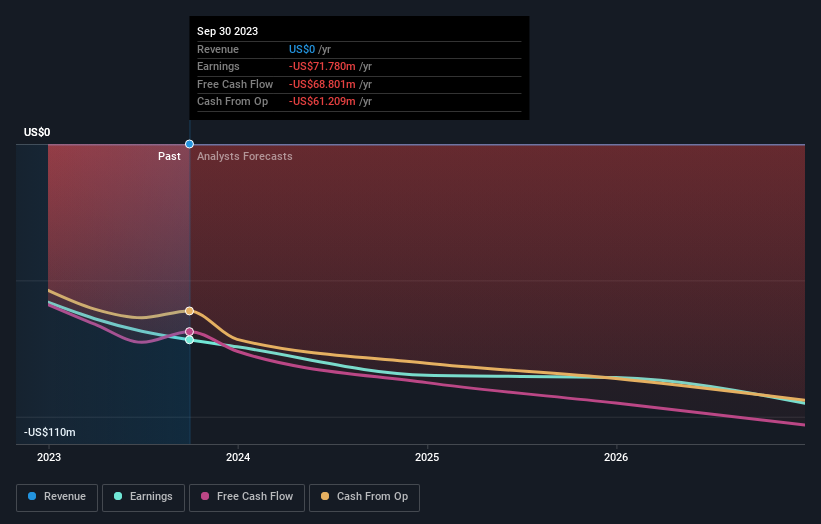- United States
- /
- Biotech
- /
- NasdaqCM:KRRO
Korro Bio, Inc.'s (NASDAQ:KRRO) market cap surged US$161m last week, private equity firms who have a lot riding on the company were rewarded

Key Insights
- Significant control over Korro Bio by private equity firms implies that the general public has more power to influence management and governance-related decisions
- 52% of the business is held by the top 5 shareholders
- Insiders have sold recently
Every investor in Korro Bio, Inc. (NASDAQ:KRRO) should be aware of the most powerful shareholder groups. And the group that holds the biggest piece of the pie are private equity firms with 33% ownership. That is, the group stands to benefit the most if the stock rises (or lose the most if there is a downturn).
As a result, private equity firms collectively scored the highest last week as the company hit US$554m market cap following a 41% gain in the stock.
Let's delve deeper into each type of owner of Korro Bio, beginning with the chart below.
Check out our latest analysis for Korro Bio

What Does The Institutional Ownership Tell Us About Korro Bio?
Institutions typically measure themselves against a benchmark when reporting to their own investors, so they often become more enthusiastic about a stock once it's included in a major index. We would expect most companies to have some institutions on the register, especially if they are growing.
As you can see, institutional investors have a fair amount of stake in Korro Bio. This suggests some credibility amongst professional investors. But we can't rely on that fact alone since institutions make bad investments sometimes, just like everyone does. When multiple institutions own a stock, there's always a risk that they are in a 'crowded trade'. When such a trade goes wrong, multiple parties may compete to sell stock fast. This risk is higher in a company without a history of growth. You can see Korro Bio's historic earnings and revenue below, but keep in mind there's always more to the story.

It looks like hedge funds own 22% of Korro Bio shares. That worth noting, since hedge funds are often quite active investors, who may try to influence management. Many want to see value creation (and a higher share price) in the short term or medium term. Atlas Venture L.P. is currently the company's largest shareholder with 14% of shares outstanding. In comparison, the second and third largest shareholders hold about 13% and 9.1% of the stock.
To make our study more interesting, we found that the top 5 shareholders control more than half of the company which implies that this group has considerable sway over the company's decision-making.
While studying institutional ownership for a company can add value to your research, it is also a good practice to research analyst recommendations to get a deeper understand of a stock's expected performance. There are a reasonable number of analysts covering the stock, so it might be useful to find out their aggregate view on the future.
Insider Ownership Of Korro Bio
The definition of an insider can differ slightly between different countries, but members of the board of directors always count. The company management answer to the board and the latter should represent the interests of shareholders. Notably, sometimes top-level managers are on the board themselves.
Insider ownership is positive when it signals leadership are thinking like the true owners of the company. However, high insider ownership can also give immense power to a small group within the company. This can be negative in some circumstances.
Shareholders would probably be interested to learn that insiders own shares in Korro Bio, Inc.. It has a market capitalization of just US$554m, and insiders have US$42m worth of shares, in their own names. Some would say this shows alignment of interests between shareholders and the board. But it might be worth checking if those insiders have been selling.
General Public Ownership
The general public, who are usually individual investors, hold a 18% stake in Korro Bio. This size of ownership, while considerable, may not be enough to change company policy if the decision is not in sync with other large shareholders.
Private Equity Ownership
With an ownership of 33%, private equity firms are in a position to play a role in shaping corporate strategy with a focus on value creation. Sometimes we see private equity stick around for the long term, but generally speaking they have a shorter investment horizon and -- as the name suggests -- don't invest in public companies much. After some time they may look to sell and redeploy capital elsewhere.
Next Steps:
It's always worth thinking about the different groups who own shares in a company. But to understand Korro Bio better, we need to consider many other factors. Be aware that Korro Bio is showing 5 warning signs in our investment analysis , and 3 of those shouldn't be ignored...
But ultimately it is the future, not the past, that will determine how well the owners of this business will do. Therefore we think it advisable to take a look at this free report showing whether analysts are predicting a brighter future.
NB: Figures in this article are calculated using data from the last twelve months, which refer to the 12-month period ending on the last date of the month the financial statement is dated. This may not be consistent with full year annual report figures.
Valuation is complex, but we're here to simplify it.
Discover if Korro Bio might be undervalued or overvalued with our detailed analysis, featuring fair value estimates, potential risks, dividends, insider trades, and its financial condition.
Access Free AnalysisHave feedback on this article? Concerned about the content? Get in touch with us directly. Alternatively, email editorial-team (at) simplywallst.com.
This article by Simply Wall St is general in nature. We provide commentary based on historical data and analyst forecasts only using an unbiased methodology and our articles are not intended to be financial advice. It does not constitute a recommendation to buy or sell any stock, and does not take account of your objectives, or your financial situation. We aim to bring you long-term focused analysis driven by fundamental data. Note that our analysis may not factor in the latest price-sensitive company announcements or qualitative material. Simply Wall St has no position in any stocks mentioned.
About NasdaqCM:KRRO
Korro Bio
A biopharmaceutical company, engages in the discovery, development, and commercialization of genetic medicines based on editing RNA for the treatment of rare and highly prevalent diseases primarily in the United States.
Flawless balance sheet moderate.

